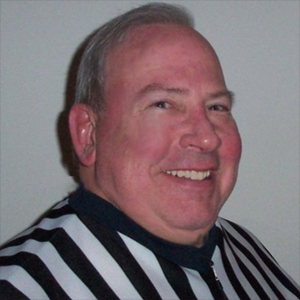
Rndballref
20 Years Experience
Chicago, IL
Male, 60
For twenty years I officiated high school, AAU and park district basketball games, retiring recently. For a few officiating is the focus of their occupation, while for most working as an umpire or basketball referee is an avocation. I started ref'ing to earn beer money during college, but it became a great way to stay connected to the best sports game in the universe. As a spinoff, I wrote a sports-thriller novel loosely based on my referee experiences titled, Advantage Disadvantage
You might not understand what the ref is doing. Many refs will not call 3 seconds unless it materially affects a play. This philosophy is called advantage / disadvantage, and is particularly useful at lower levels. Don't be the parent or coach who wants a turnover because a low skilled player is camped out in 3 seconds (or an unguarded dribbler carries the ball in the backcourt). They will call it if the ball gets dumped in there, but if it is not material forget it. If you find a ref at a lower level who calls everything in the rule book, everytime, you have a ref who will ruin every game
If you get a timeout before 10 seconds is called, the 10 seconds is reset. Just as on a throw-in gets reset to 5 on a timeout. Only the shot clock stays where it was on a time out.
No you don't get the points. The referees should stop the game once they realize the game is being played in the wrong directions. Points made, stand. Turn the teams around, and the refs should be incredibly embarrassed. This is very simple. The home teams picks which bench they want to use before the game. Each team scores at the basket opposite of their benches in the first half. Bad officiating - whether it is a two or three person crew someone should have caught it DURING THE WARMUPS!
Merely asking for timeout when your team does not have possession is not a technical foul, UNLESS it is done in a purposeful, unsportsmanlike manner. So if you ask for the timeout in the way you normally ask, the referee should ignore you, and better yet say something like "no timeout, you don't have possession". If my judgement was that the coach was trying to get an advantage, such as an erroneous whistle (to get a sub in for instance, or give his players a short rest), or to distract the officials from the game then I would call an unsportsmanlike technical. Having said all of that, I have never called a T on a coach for asking for a timeout without ball possession.
Call Center Employee (Retail)
 What's the meanest thing someone's said to you on the phone?
What's the meanest thing someone's said to you on the phone?
Chick-fil-A General Manager
 What's the back-story behind the cow mascot and eat-mor-chikin campaign?
What's the back-story behind the cow mascot and eat-mor-chikin campaign?
Private Detective
There is great debate here about whether you should call every infraction, or should you call violations and infractions only if there is a change in advantage? I personally believe that it is better to use the Advantage/Disadvantage considerations at the lower levels where the skill set is more limited. If, in a freshman game you call everything you will most assuredly ruin the flow of basketball and probably foul out most of the starters. At the varsity level, or college there is less to NOT CALL. Mark Cuban, owner of the NBA Dallas Mavericks is strongly against Advantage/Disadvantage officiating in the NBA. Juries out, and every official I know has a different take on this (and so do the coaches).
This was asked by steve w in his June, 2012 questions. Here is the answer I gave him: First, the rule. Your position on the court is based on where you stood (or touched last). So after a rebound a player establishes himself out of bounds (one foot or two), and then lifts a foot through an imaginary plane along the baseline, he is not inbounds until his foot hits the floor inbounds - no violation for breaking the plane by the player throwing in the ball. Secondly, there is the dominent philosophy of basket officating called, "Advantage Disadvantage" which holds that you should only stop the game if an opposing player caused a change in A/D. So, you pass on uncontested palming in the backcourt for example.
Every state has its own rules. In Illinois you have to be at least 17 years old to be "patched" by the state. You must be patched by the state to work high school games. However, many park districts and youth clubs hire younger officials to work games. Some of them also offer training and mentoring of young teenagers.
-OR-
 Login with Facebook
Login with Facebook (max 20 characters - letters, numbers, and underscores only. Note that your username is private, and you have the option to choose an alias when asking questions or hosting a Q&A.)
(A valid e-mail address is required. Your e-mail will not be shared with anyone.)
(min 5 characters)
By checking this box, you acknowledge that you have read and agree to Jobstr.com’s Terms and Privacy Policy.
-OR-
 Register with Facebook
Register with Facebook(Don't worry: you'll be able to choose an alias when asking questions or hosting a Q&A.)